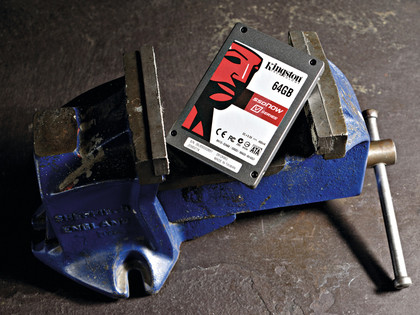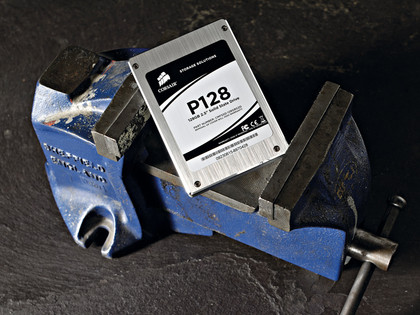6 super-fast SSDs to speed up your PC
Solid state of the art - all the fastest SSDs in one place

Kingston SSDNOW V Series 64GB - £105
Score: 6/10
+ Relatively affordable
+ Decent maximum data throughput
- Patchy real-world experience
- Awful random access performance
Ping any of the big online retailers for SSDs and you'll find a huge array of brands and models. Verily the solid state drive has entered the mainstream.
Consequently, prices are edging downwards daily, if not quite at the pace we'd like. The big question, therefore, is how much do you need to spend to get a decent SSD?
Get daily insight, inspiration and deals in your inbox
Sign up for breaking news, reviews, opinion, top tech deals, and more.
Making the argument for the entry level choice is Kingston's SSD Now V Series in 2.5-inch, 64GB trim.
In terms of both key performance metrics and capacity it's about as low as we would recommend you go.
Despite that, it still weighs in at a not insubstantial £105. Make no mistake, even modest SSDs remain painfully pricey. That's especially true in the context of the Kingston's stingy 64GB capacity.
After all, £100 will bag you 1.5TB's worth of rotational hard disk. Put another way, a conventional hard drive is no less than 23 times more cost effective when it comes to storage capacity. Yikes.
Still, at least the puny size kills stone dead any debate regarding the usage model for this sort of drive. It's not even close to being big enough for mass data storage.
Better instead to use it as a boot drive containing the operating system and key applications, while conventional magnetic disks do mass storage duties. For most people, 64GB will be enough for that purpose.
Problems for games
Those with large game libraries, however, might find themselves running out of space rather rapidly. Moreover, given the tendency for SSD performance to degrade when rammed to bursting with data, not to mention the fact that modern day-to-day PC usage can generate multiple gigabytes of garbage such as internet cache files and general desktop detritus, a 64GB limit is a potential irritation.
If you can live with that, the Kingston gives you an SSD with frankly mediocre sequential transfer rates.
Along with every other drive here, the V Series sports multi-level-cell (MLC) flash memory, in this case manufactured by Japanese electronics leviathan Toshiba. That makes for denser, cheaper memory chips.
But with peak sequential read performance of 100MB/s and writes of 80MB/s, they're not as fast as the MLC competition, much less single-level-cell (SLC) memory.
The other crucial part of any SSD is the controller chip. Here there's cause for further concern thanks to the presence of a controller based on the infamous JMicron design. Infamous, that is, for the stuttering problems that early SSDs suffered from.
The choice of this elderly controller is clearly a cost play. However, Kingston says it has been working closely with both JMicron and Toshiba to ensure a stutter-free performance.
Whatever the truth, the V Series comes in two packages, desktop and notebook. Both contain exactly the same 2.5-inch SSD with standard SATA connectors. The notebook version tested here sports both a handy USB enclosure and a copy of Acronis True Image HD.
The idea is that you use the USB enclosure and disk-cloning application to transfer an image of your hard disk onto the V Series before swapping it out. Overall, it's a nice package and looks good value compared to the next rung up in the SSD hierarchy, represented here by Corsair's P128.

Corsair P128 128GB - £265
Score: 7/10
+ Sports the latest Samsung technology
+ Monster sequential read and write numbers
- 4K random writes are a worry
- Not exactly cheap
As the name suggests, this is a 128GB 2.5-inch drive with a £265 sticker. Boy do you pay dearly for the additional capacity.
In return, however, you receive the latest Samsung SSD technology with both flash memory and an ARM-based controller CPU supplied by the Korean giant. In fact, this drive is essentially a 128GB version of the uber-expensive 256GB Samsung PB22-J.
That means it boasts a so-called 'self healing' function that addresses the problem of residual data in memory blocks. How well this works is tricky to judge. The feature is said to kick-in only after a cold boot, with the system left to idle.
In any case, the claimed maximum read performance looks hot to say the least at 220MB/s. Even more impressive are the nearly symmetrical 200MB/s writes. That's huge for a drive based on MLC flash memory.
On paper, therefore, this looks like a bit of a mismatch, an impression backed up by our synthetic benchmarks. Despite returning an unexpectedly healthy sequential read result of 126MB/s, the Kingston drive lags well behind the 215MB/s peak read performance of Corsair's P128.
It's a similar situation in the write performance test, where 92MB/s plays 189MB/s.
However, more worrying are the 4K random write performance results. This test is designed to more closely simulate the sort of disk activity you get during normal PC use than sequential benchmarks and it makes for very ugly reading for Kingston at just 0.24MB/s. Frankly, the Corsair's 3.64MB/s result is hardly stellar, either. It's altogether rather worrying stuff.
Gap dance
Back in the real world, however, the gap is not so obvious. Subjectively, we think a hint of lag is detectable from the Kingston V Series in general use
But there's relatively little evidence of it in our real world benchmarks. It's just a second behind the Corsair drive in our game level load test and more or less matches several of the most expensive drives on test this month when it comes to in-game frame rates.
Similarly, it completes the file unzip test in one minute and 14 seconds, a reasonable result compared to the 58 seconds required by the Corsair drive. The only major anomaly is the application install where it requires over two minutes to complete the task, nearly twice as long as the Corsair P128.
Still, along with the terrible 4K write result, it's enough to make us worry about the V Series' long-term reliability. As for the Corsair, it delivered pretty solid real world results. But here too the 4K write results are a cause for concern. However much you pay, it seems there's no such thing as the perfect SSD.
Current page: Low-end SSDs from £105 to £265
Prev Page Solid state drives: Overview Next Page Mid-range SSDs from £286 to £302Technology and cars. Increasingly the twain shall meet. Which is handy, because Jeremy (Twitter) is addicted to both. Long-time tech journalist, former editor of iCar magazine and incumbent car guru for T3 magazine, Jeremy reckons in-car technology is about to go thermonuclear. No, not exploding cars. That would be silly. And dangerous. But rather an explosive period of unprecedented innovation. Enjoy the ride.